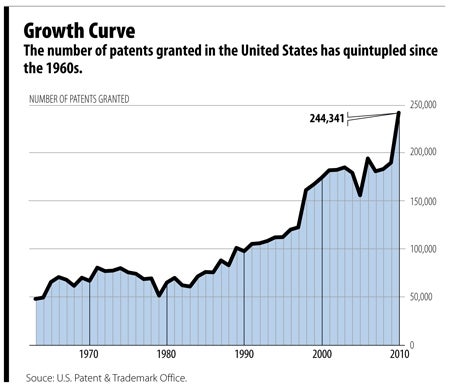Big companies with operations in Central Massachusetts like Abbott Labs, Genzyme and Boston Scientific are hailing efforts in Congress to reform the federal patent office.
But legislation being hashed out by the House and Senate has smaller companies crying foul. They say that the bill, called the America Invents Act, would strip away protections for smaller inventors that have existed for several hundred years.
Some local patent attorneys say that bigger and deeper-pocketed patent filers could soon gain a greater advantage if Congress opts to move the country from a “first-to-invent” system to a “first-to-file” system. Meanwhile, proponents say the legislation would bring the nation’s system into line with the rest of the world.
Get In Line
Under the proposal, the first to file a patent with the U.S. Patent and Trademark Office on a particular invention wins. No inventor would be able to come in after the fact with a challenge saying they invented the item first, as they can under the current system, though such challenges (called patent interference) are rare, according to patent office statistics.
But both sides agree on a provision in the Senate version of the bill that would ban Congress from diverting fees generated by the patent office into other coffers. With more money in its budget, the patent office could better process a large backlog of applications.
Gerry Blodgett, a Worcester-based patent lawyer at Blodgett & Blodgett, said that he wants the patent office to be more efficient, but he is concerned about moving to a first-to-file system.
“It seems to me that the idea of rewarding the patent to the person who realizes the legal side first as opposed to the side that invented is simply unjust,” Blodgett said.
Instead, Blodgett envisions inventors rushing their first patent and then filing successive patents as their idea develops.
“They’re going to basically be a whole series of evolutionary steps, each one of which costs a lot of money,” he said. “What’s going to happen is all the little people won’t do any more inventing.”
Erik Heels, of Clock Tower Law Group in Maynard, said that he is also against the legislation.
“The whole idea that you can attract smart people to come to this country by providing this incentive for their inventive work is, I think, a wonderful ideal and American type of system,” Heels said. “As soon as you water that down with something that rewards large corporations who have a budget to file as many patents as fast as they can, it really does disadvantage the small inventor and small companies.”
The Other Side
But not so fast, said John B. Pegram, a senior principal with Fish & Richardson PC, which has offices in Boston and around the country. The patent firm, which is one of the largest in the country, counts Boston Scientific and Genzyme, two supporters of the bill, among its clients.
Pegram said that opponents of patent reform are framing it as a loss of an American system or ideal.
“There’s a lot of flag waving going on,” Pegram said.
Pegram feels that the uniqueness of the American patent system does not necessarily make it better than the rest of the world. And he said that the benefits of the change would outweigh any downside.
“They (the proposal’s opponents) have not documented that a significant number of small inventors would be disadvantaged,” he said.
The single most important thing that the bill could accomplish, he argued, is providing more funding to the patent office, which will help put a dent in a long backlog of more than 1 million pending patent applications that have piled up over the past decade. The bill would let the patent office keep all of the fees it generates. Patent officials have said they would use that money to hire more examiners.
“This whole process has been worthwhile if for no other reason than the fees issue,” Pegram said.

